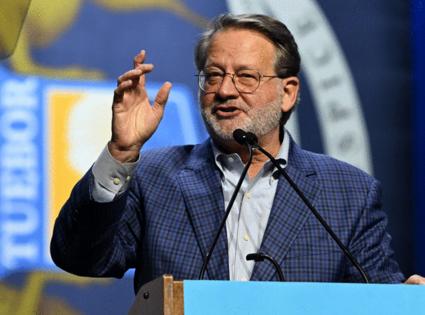Michigan Sen. Peters' bill would exempt weather forecasting offices from federal hiring freeze
Published in Political News
WASHINGTON — Michigan U.S. Sen. Gary Peters has introduced a bipartisan bill in Congress that aims to exempt certain National Weather Service positions from a federal hiring freeze, saying the agency needs to be able to adequately staff positions that notify the public of extreme weather events that could harm people or property.
The legislation comes after mass layoffs, firings and early retirement offers extended by the Trump administration have caused staff shortages at NWS, so some offices no longer have 24-hour coverage.
Peters' office said the reductions have meant so few staff remain in Marquette’s forecasting office that they may be forced to suspend overnight staffing "in the coming weeks."
“We know that in the Upper Peninsula, weather can change on a dime. That’s why we need a team of full-time meteorologists working around the clock to notify the public when extreme weather impacts the region,” Peters said in a statement.
“This bill would help protect 24/7 weather monitoring in the UP and ensure we keep our communities informed and protected.”
The National Weather Service, with a staff of 4,000, lost a total of about 600 employees over 60 days this year due to a combination of early retirements, buyouts and firings, said Tom Fahy, legislative director for the union representing NWS employees. Over 80% of the staff cuts were in weather forecasting offices around the country, Fahy said.
The agency has been unable to rehire for those positions due to the hiring freeze imposed by President Donald Trump on his first day in office in January. The 600 employees is equivalent to the number of staff who left the NWS from 2010-2025 due to usual attrition or retirement, Fahy said.
The NWS, which is part of the National Oceanic and Atmospheric Administration (NOAA), on Monday refused to confirm to The Detroit News whether the Marquette office currently has the staffing to remain operating overnight.
Spokeswoman Erica Grow Cei said NOAA leadership is taking steps to address those who took a voluntary early retirement option, and that the NWS continues to assign short-term, temporary duty assignments.
Cei also said the agency is in the process of advertising a series of "reassignment" opportunities to fill roles at NWS field locations "with the greatest operational need." A targeted number of permanent, "mission-critical" field positions would soon be advertised under an exception to the department-wide hiring freeze to further stabilize frontline operations, she said.
Peters introduced the new bill with Republican Sen. Jerry Moran of Kansas, who said the staff shortages have left NWS offices in Kansas unable to provide around-the-clock weather forecasting.
The bill's exemptions includes meteorologists, hydrologists and field technicians ― roles responsible for issuing weather and flood warnings, maintaining critical observational equipment and protecting life and property, according to a bill summary.
The legislation would reverse any job offers that were rescinded on or after Jan. 20, 2025, and requires the secretary of commerce to submit a report on staffing levels at the NWS a year after enactment for the exempted positions.
Moran in a release said he recently secured a national exemption from the federal hiring freeze to enable the NWS to hire meteorologists and weather forecasters, noting that as employees had retired or left the agency, the Goodland NWS office had ended night-time forecasting in May due to staffing shortages.
It's unclear whether the Marquette NWS office has been able to maintain overnight staffing since the cuts.
The Washington Post reported last month that the office would close overnight starting May 18 because it didn't have enough meteorologists to staff. But the NWS later denied that in a report by a U.P. television station, saying that it would maintain 24-hour operations.
Fahy said the NWS office in Marquette is currently fully staffed with an overnight substitute with the exception of the weeks of June 15 and 29, according to information he's received from the agency. The NWS has been moving staff around to try to fill gaps, he said.
During those weeks, meteorologists from the Green Bay and Gaylord offices will monitor whatever is going on weather-wise in Marquette's region, he said.
"This is something that never should have happened," Fahy said of the staff shortages.
He noted that the National Weather Service last week announced plans for 126 hires, including meteorologists that will hopefully help with gaps in staffing, though the positions still need to be appropriated by Congress.
Peters questioned Commerce Secretary Howard Lutnick last week about the NWS staff shortages at a hearing. Lutnick suggested that the NWS technology is so outdated that 24-hour monitoring at regional NWS offices shouldn't be needed.
"You don't understand it yet because no one's explained it to you. These are hard-drive computers, literally, that no one has seen in 25 years, with green screens in these offices," Lutnick said.
"They should be on a cloud. Our 2,000 meteorologists should be able to watch them 'round the clock."
Republican U.S. Rep. Jack Bergman of Watersmeet, who represents the U.P., also complained about outdated technology that the NWS is working with.
"Whether it's the National Weather Service or it's Air Traffic Control system, we are really past the point of needing to reconfigure the system to use the advanced technology today that we have available to us," Bergman told The Detroit News.
"That's going to fall into that category, to be able to monitor the weather in a different way. And the technology is already there. We just bureaucratically haven't upgraded to it because it meant changing something."
_____
©2025 www.detroitnews.com. Visit at detroitnews.com. Distributed by Tribune Content Agency, LLC.

























































Comments